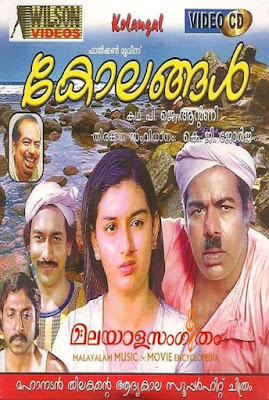Director: Adoor Gopalakrishnan
Writer: Adoor Gopalakrishnan
Cinematography: Mankada Ravi Varma
Cast: Asokan, Mammooty, Shobana
Language: Malayalam
Ajayan was an orphan boy who was left at an hospital, the place of his birth. He is adopted by a widower doctor who also has a much more elder son (Mammooty). The film is told largely through monologues by the Ajayan character as he tries to narrate how he became what he is now.
The younger version of Ajayan is played by Sudeesh and the older version by Asokan. The last shot of the film has Ajayan as a boy counting the steps to a pond by using only odd numbers and just after that him doing the same but this time with even numbers. That essentially explains the film or what Adoor is trying to do. The first half of the film goes in a feel good fashion as it is mostly good things that Ajayan narrates. But second half is like a psychological horror with Ajayan choosing to tell all things that he left out initially. So the film is basically about storytelling and how our perceptions about things are shaped by what is revealed to us.
The sad thing about the film is that while the concept is really good, the execution is not that great. Film suffers with some poor performances in first half with extended silences that doesn't look natural and you feel as if actors are not sure about how awardishly they should behave. It would have aided the film a lot more if the behaviour was quite normal in first half as it would have made for an even more impactful second half when the nature of the film flips. It is hard for me to take Shobana seriously in her earlier roles because we got so used to the voice that dubbed for her in the latter part of her career. Mamootty is quite good throughout but Asokan is not consistently good. Overall it is still a good watch but could have been a much greater film with better execution. It just doesn't get past its conceptual greatness. It did win Adoor a national award and he is said to have modeled the protagonist based on himself- a dual personality who is both an introvert and an extrovert.
Rating: 3/5
Writer: Adoor Gopalakrishnan
Cinematography: Mankada Ravi Varma
Cast: Asokan, Mammooty, Shobana
Language: Malayalam
Ajayan was an orphan boy who was left at an hospital, the place of his birth. He is adopted by a widower doctor who also has a much more elder son (Mammooty). The film is told largely through monologues by the Ajayan character as he tries to narrate how he became what he is now.
The younger version of Ajayan is played by Sudeesh and the older version by Asokan. The last shot of the film has Ajayan as a boy counting the steps to a pond by using only odd numbers and just after that him doing the same but this time with even numbers. That essentially explains the film or what Adoor is trying to do. The first half of the film goes in a feel good fashion as it is mostly good things that Ajayan narrates. But second half is like a psychological horror with Ajayan choosing to tell all things that he left out initially. So the film is basically about storytelling and how our perceptions about things are shaped by what is revealed to us.
The sad thing about the film is that while the concept is really good, the execution is not that great. Film suffers with some poor performances in first half with extended silences that doesn't look natural and you feel as if actors are not sure about how awardishly they should behave. It would have aided the film a lot more if the behaviour was quite normal in first half as it would have made for an even more impactful second half when the nature of the film flips. It is hard for me to take Shobana seriously in her earlier roles because we got so used to the voice that dubbed for her in the latter part of her career. Mamootty is quite good throughout but Asokan is not consistently good. Overall it is still a good watch but could have been a much greater film with better execution. It just doesn't get past its conceptual greatness. It did win Adoor a national award and he is said to have modeled the protagonist based on himself- a dual personality who is both an introvert and an extrovert.
Rating: 3/5











